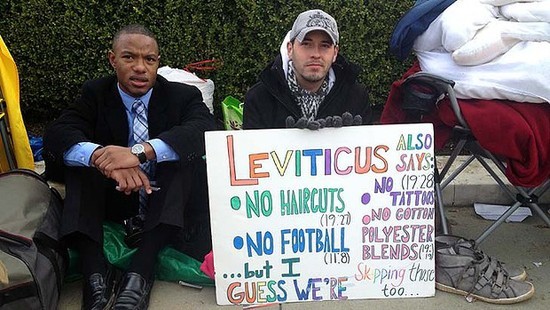Author: Nick O’Malley
Publication: Sydney Morning Herald
Publication Date: March 28, 2013
James Tolver, a serious-looking 21-year-old in a neat blue suit, sat patiently on the footpath outside the US Supreme Court as the justices inside began hearing arguments over gay marriage.
He had driven 5½ hours from Ohio to wait 36 hours in snow, rain and bright cold sun in the hope he might see some of the second day’s proceedings.
Asked why, he said: ”I am an African-American person and 56 years ago other people waited out here in the cold so they could watch arguments over whether I could marry anyone I wanted.
”If they could do that for me, I can do it for someone else.”
Whatever the outcome in the Supreme Court, there is a feeling that gay marriage is now inevitable.
It is the link Mr Tolver drew between civil rights and gay marriage that drives that optimism – however slowly, that civil rights have always expanded in America. There is now a view that reverence for the nation’s founding documents – for life, liberty and the pursuit of happiness – makes that expansion unstoppable.
Inside the court on Monday, the justices heard arguments over whether California’s Proposition 8 – a law banning gay marriage that was introduced by a referendum backed by the Mormon Church – was constitutional.
The justices considered arguments over whether gay marriage could sever the traditional link between marriage and procreation. Sceptical liberal justices noted that such an interpretation could exclude anyone who could not procreate, such as older people or prisoners.
Some of the more conservative members of the bench noted that gay marriage was new to the US – just nine years old in the first state to adopt it – and as a result it was not clear what broader effect it could have on society. It was suggested that this was a matter better adjudicated by elected representatives than the court.
The court will consider the Defence of Marriage Act, a federal law passed by Bill Clinton, that defines marriage as being between a man and woman, and excludes gay couples from some federal benefits.
The act can be used as a measure of just how quickly American attitudes towards homosexuality have changed. Mr Clinton – who is known to have long regretted signing the law – turned on the act this week, writing in an opinion piece in The Washington Post: ”Reading those words [in the act] today, I know now that even worse than providing an excuse for discrimination, the law itself is discriminatory. It should be overturned.”
Jim and Betty Rowe, a veterinarian and a nurse who travelled from Pennsylvania with their homemade signs to attend a rally in support of a biblical interpretation of marriage, said the gay marriage movement erupted so fast that opposition to it was not yet properly organised. They attribute the pace to Barack Obama’s endorsement of recognition 11 months ago. In truth, the President followed much of his party and in the end was forced to speak out by his Vice-President, Joe Biden, who gazumped him in an interview.
A poll analysis by psephologist Nate Silver this week showed opposition to gay marriage had fallen from nearly 70 per cent to 42.5 per cent since 1996, while support had grown from 29 per cent to 51 per cent.
Across the road from Mr Tolver was a retired transport worker from nearby Maryland, who chose not to give his name. He was baffled by the rally he saw before him and seemed saddened that the court would even consider the matter.
”It just doesn’t add up,” he said. ”The female body is designed to connect with the male body and to create life and that is the way God made it.”

